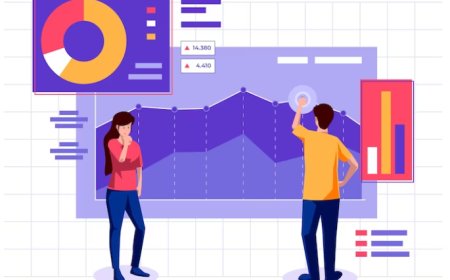Data Science Course Specializations
Discover data science courses, specializations, machine learning, AI, statistics, big data, programming, certifications, career growth, and training

As a student eager to enroll in a Data Science course, the multitude of specializations can indeed feel overwhelming. Each specialization offers a unique pathway, demanding diverse skills and promising exciting career prospects. Getting around in this environment requires introspection into personal interests, strengths, and aspirations. Understanding the distinct focus and applications of each specialization becomes crucial in aligning one's passion with a career trajectory. Exploring the aspects, skill requirements, and potential opportunities within these specializations will ultimately guide the decision toward the most fitting and fulfilling path in the Data Science field.
As a professional seeking to upskill in Data Science, the plethora of specializations presents a challenging dilemma. Each specialization boasts its distinct advantages and complexities, making it tough to pinpoint the ideal choice aligning with specific career aspirations. The decision on a careful balance between personal interests, existing skills, and future career prospects. Evaluating the unique benefits, challenges, and potential growth opportunities within each specialization becomes pivotal in making a strategic choice that harmonizes with long-term career goals and professional advancement in the scenery that is ever-changing of Data Science.
Exploring the diverse environment of Data Science, comprises several primary specializations, each with distinct skill demands and career trajectories. From Machine Learning Engineering, Data Analysis, and Data Engineering, to Big Data Analytics, these specializations vary widely in the expertise they require and the diverse range of career paths they open up across industries.
1. Machine Learning and Artificial Intelligence (AI)
Programming Languages Proficiency:
- Python: Widely used in data science due to its versatility and numerous libraries for machine learning and data manipulation.
- R: Especially popular for statistical analysis and visualization in data science.
- Java: Known for its performance and usage in building enterprise-level applications, including AI systems.
Statistical Understanding:
- Statistics: Essential for analyzing data, understanding distributions, probabilities, hypothesis testing, and making inferences.
- Probability Theory: Crucial for comprehending uncertainty in data and making probabilistic models in machine learning.
Linear Algebra:
- Understanding concepts like matrices, vectors, and linear transformations is fundamental in various machine learning algorithms and neural networks.
Machine Learning Frameworks:
- TensorFlow: Popular for building and deploying machine learning models, especially neural networks.
- PyTorch: Known for its flexibility and ease in building deep learning models.
- Scikit-learn: Offers simple and efficient tools for data mining and data analysis, suitable for various machine learning tasks.
Application Development: Knowledge of developing applications utilizing machine learning models is beneficial. Understanding how to deploy models in situations that are actual, handle data pipelines, and integrate models into applications or systems.
Problem-Solving Skills: Ability to identify problems suitable for machine learning solutions and formulate them as ML tasks. Proficiency in choosing appropriate algorithms and techniques for various tasks like classification, regression, clustering, etc.
Data Preprocessing and Feature Engineering: Skills in cleaning and preparing data for machine learning models. Feature engineering involves creating new features from existing data to improve model performance.
Model Evaluation and Optimization: Understanding various metrics to assess model performance and techniques to optimize models for better accuracy and efficiency.
Deep Learning Concepts (For Advanced Levels): Understanding neural networks, different architectures like CNNs, RNNs, GANs, and advanced techniques in deep learning.
Continuous Learning: Given the evolving nature of AI and machine learning, a willingness to continuously learn and adapt to new technologies and techniques is essential.
Career Opportunities:
Roles such as Machine Learning Engineer, AI Research Scientist, and Data Scientist with a specialization in machine learning or AI are prevalent in this field.
2. Data Analytics and Visualization:
Data Tools Proficiency: Proficiency in tools like SQL, Excel, or similar platforms is fundamental for handling and manipulating data efficiently. SQL allows querying and managing databases, Excel aids in data organization and basic analysis, while other tools provide additional functionalities for data manipulation and analysis. This skill is crucial for accessing, transforming, and preparing data for analysis.
Data Cleaning and Wrangling: Understanding techniques for data cleaning and wrangling is indispensable. It involves tasks like handling missing data, removing duplicates, standardizing formats, and transforming data to make it suitable for analysis. These processes ensure data accuracy and reliability, laying the groundwork for meaningful analysis and decision-making.
Visualization Tool Familiarity: Proficiency in visualization tools such as Tableau, Power BI, and Matplotlib enhances the ability to present data visually. These tools offer diverse options for creating interactive and insightful visualizations, including charts, graphs, and dashboards. They enable the conveying of complex information in a compelling and understandable format, facilitating effective communication of data-driven insights.
Insightful Visualization Skills: The ability to create impactful visual representations of complex data sets is a valuable skill. It involves not just using visualization tools but understanding how to craft visuals that tell a story and reveal patterns or trends within data. It requires selecting the right visualization type, designing clear and intuitive graphics, and interpreting data in ways that resonate with diverse audiences.
Career Opportunities:
Roles such as Data Analyst, Business Analyst, and Data Visualization Specialist align with this specialization. These professionals are responsible for interpreting data and providing actionable insights to drive business decisions.
3. Data Engineering
Programming Proficiency: Proficiency in programming languages like Python, Java, or Scala is crucial for data engineering tasks. Python's versatility and extensive libraries make it ideal for data manipulation and analysis. Java's robustness and scalability suit larger applications, while Scala's conciseness and compatibility with big data frameworks are valuable for distributed computing.
Distributed Computing Frameworks: Understanding frameworks like Hadoop, Spark, and Flink is vital for handling large-scale data processing. Hadoop facilitates the distributed storage and processing of big data, while Spark accelerates data processing with in-memory computation. Flink excels in stream processing, enabling real-time analytics on massive datasets.
Database Expertise: Proficiency in SQL for relational databases and an understanding of NoSQL databases are essential for efficient data management. SQL enables querying and managing structured data, while NoSQL databases like MongoDB or Cassandra handle unstructured or semi-structured data efficiently, catering to diverse data types in modern applications.
Data Warehousing Concepts: Understanding data warehousing concepts is critical for structured data storage. Concepts like star schemas, data cubes, and ETL (Extract, Transform, Load) processes are fundamental for designing and managing databases optimized for querying and reporting.
Career Opportunities:
Roles like Data Engineer, Big Data Engineer, and Database Administrator are prevalent in this field. Data engineers are responsible for managing data infrastructure, ensuring data quality, and developing systems for efficient data processing.
4. Business Intelligence (BI) and Decision Science
Analytical Strength: Strong analytical capabilities are fundamental in dissecting complex problems, identifying patterns, and extracting insights from data. It involves the ability to critically analyze data sets, interpret results, and draw meaningful conclusions. These skills aid in uncovering trends, correlations, and anomalies, laying the groundwork for informed decision-making.
Statistical Proficiency: Mastery in statistical analysis and modeling is crucial for interpreting data accurately. Proficiency in statistical techniques allows professionals to derive robust conclusions, build predictive models, and validate hypotheses. It involves understanding probability distributions, regression analysis, hypothesis testing, and more to extract reliable insights from data.
Business Domain Knowledge: Understanding business processes is vital for contextualizing data insights. It involves grasping the industry's nuances, key performance indicators, and operational workflows. This understanding enables data professionals to align analytics outcomes with business goals, ensuring that data-driven insights directly contribute to organizational objectives.
Tool Familiarity: Proficiency in tools like Tableau, Power BI, or statistical software such as R or SAS amplifies the ability to visualize and analyze data effectively. These tools empower professionals to create interactive dashboards, conduct advanced analytics, and communicate insights succinctly, bridging the gap between raw data and actionable insights.
Data-driven Decision-making: The ability to leverage data for informed decision-making is the crux of these skills. It involves using data-driven insights to guide strategic and tactical decisions within an organization. Professionals adept in data-driven decision-making can identify opportunities, mitigate risks, optimize processes, and drive innovation based on empirical evidence derived from data analysis.
Career Opportunities:
Roles such as Business Intelligence Analyst, Decision Scientist, and Strategy Consultant are common in this field. Professionals in these roles use data-driven insights to guide strategic decisions and optimize business processes.
The vast field of data science presents numerous specializations, catering to a range of interests from predictive analytics to data visualization and machine learning. Each specialization provides an opportunity to acquire essential skills and expertise. Enrolling in a data science program tailored to these specializations can enhance career prospects, enabling individuals to become valuable assets in this ever-evolving field. Whether exploring the complexities of machine learning algorithms or honing the skill of transforming data into compelling visual stories, pursuing a data science specialization fosters professional development and the ability to make meaningful contributions to the dynamic world of data-driven innovation.
Refer these articles:




































